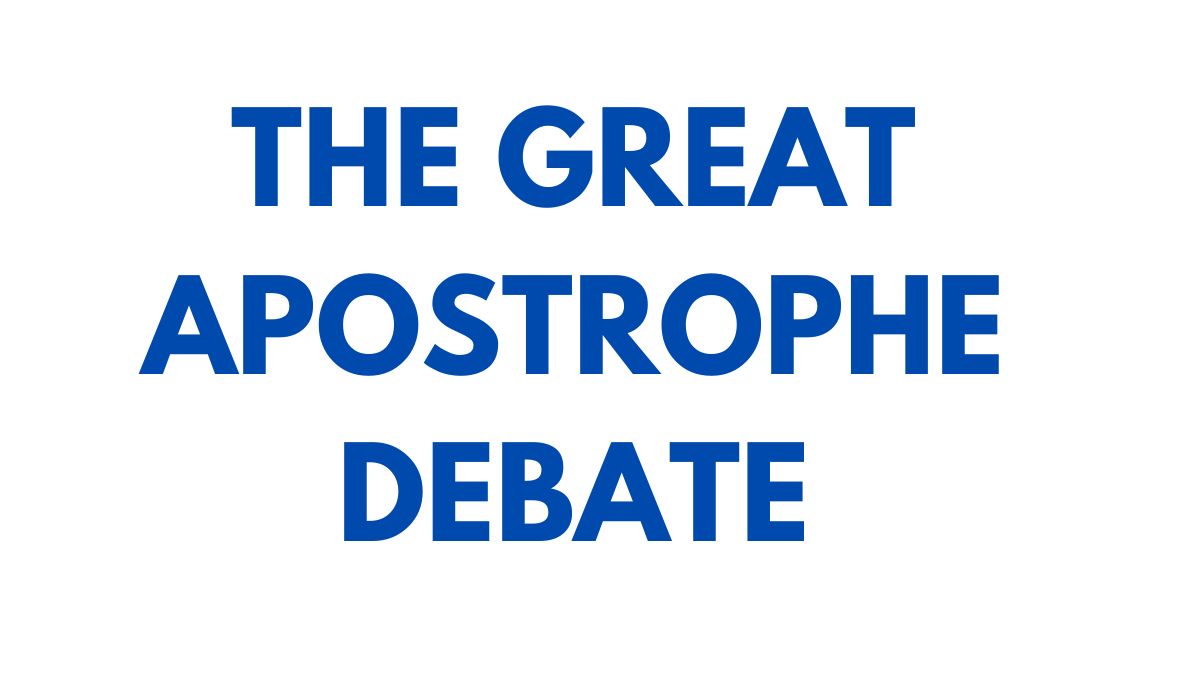The Great Apostrophe Debate has long fascinated writers, editors, and language enthusiasts alike. At its core, it concerns the proper use of possessive apostrophes, particularly in names ending with “s,” plural forms, and varied style guide recommendations. High-profile instances, such as headlines about Kamala Harris and Tim Walz, have reignited discussions on correct apostrophe placement.
Legal documents like Marsh v. Chambers (548 U.S. 163, 2006) further show that punctuation errors can have serious consequences. Understanding the debate is essential for clarity, professionalism, and credibility in both formal and casual writing.
Understanding the Great Apostrophe Debate
The debate over apostrophe usage highlights the fine balance between grammar precision and everyday writing conventions. Historically, apostrophes were used to indicate omitted letters or possession, but their rules became increasingly complex over time. Confusion often arises with plural nouns, singular possessives, and proper nouns ending in “s.”
Style guides such as AP style and the Chicago Manual of Style have different approaches, causing debates among writers and journalists. Public attention has intensified due to media coverage and political headlines involving Harris’ running mate, showing how punctuation mistakes can spark cultural and professional scrutiny.
Origins of Apostrophe Usage
Apostrophes first appeared in English to clarify meaning and avoid ambiguity.
Why Writers Care
Correct apostrophe use reflects professionalism and attention to detail.
Common Misunderstandings
Confusion between plural and possessive forms is widespread.
Cultural Significance
The debate mirrors broader attitudes toward language and literacy.
Possessive Apostrophes: Rules and Confusion
Understanding possessive apostrophes is essential to resolving the debate. Singular possessives are typically formed by adding ’s (e.g., “the teacher’s book”), while plural possessives require placing the apostrophe after the plural s (e.g., “teachers’ lounge”). Names ending in “s” are especially contentious.
For example, should a headline read “Harris’s speech” or “Harris’ speech”? AP style often simplifies to “Harris’,” while Chicago style retains “Harris’s.” Misplaced apostrophes in prominent contexts, such as political coverage or academic writing, illustrate why writers must follow style guides consistently.
Singular Possessives
Add ’s for ownership or association.
Plural Possessives
Add an apostrophe after the plural s to indicate ownership.
Proper Nouns Ending in S
AP vs. Chicago style differs for clarity and readability.
Style Guide Comparisons
Consistency across your document prevents confusion and maintains credibility.
Political and Public Controversies
The Great Apostrophe Debate often spills into politics and media. Headlines involving Kamala Harris, Tim Walz, and other figures have demonstrated how punctuation errors influence public perception. Misuses like “City Leader Hit’s Back on Crime” or product labeling errors (“mens coat’s”) show the consequences of inconsistent apostrophe placement. According to an AP-NORC poll, six out of seven readers notice grammar mistakes in news stories, highlighting the public’s sensitivity.
Social media amplifies these controversies, making grammar debates more visible. The debate is no longer academic; it shapes perceptions of professionalism and trustworthiness.
Campaign Headlines Gone Wrong
Political coverage often highlights punctuation mistakes.
Media vs Grammar Experts
Conflicting opinions show the complexity of style choices.
Public Engagement
Social media spreads and debates grammar controversies widely.
Poll Data and Surveys
Research shows widespread attention to punctuation accuracy among readers.
Legal and Academic Implications
Punctuation precision is critical in legal and academic contexts. In Marsh v. Chambers (548 U.S. 163, 2006), correct apostrophe usage contributed to the clarity of rulings. Academic papers also demand strict adherence to style guide rules, whether AP, Chicago, or Oxford. Misplacing an apostrophe can alter meaning, create ambiguity, or reduce the credibility of a document. Writers should consistently apply rules, especially in high-stakes writing, to avoid confusion and demonstrate attention to detail.
Court Cases Involving Apostrophes
Legal cases demonstrate the real-world consequences of punctuation errors.
Legal Writing Guidelines
Proper apostrophe usage ensures clarity and reduces misinterpretation.
Academic Publications
Scholarly works require uniform punctuation to maintain professionalism.
Risks of Misuse
Errors can undermine authority, lead to miscommunication, or damage reputations.
Common Mistakes and Misuses
Even experienced writers frequently misuse apostrophes. Examples include the greengrocer’s apostrophe, such as writing “apple’s for sale” instead of “apples for sale.” Misused holiday references like “Christma’s party” or headline mistakes like “City Leader Hit’s Back on Crime” remain common.
Authors like Lynne Truss, in Eats, Shoots & Leaves, call these errors “satanic sprinklings”, showing how passionate debates over punctuation can be. Recognizing common errors is the first step toward mastering apostrophe use.
Everyday Misuses
Errors often occur in signs, advertisements, and menus.
Headlines and Media Examples
Misused apostrophes appear frequently in journalism and marketing.
Grammar Myths
Many misconceptions persist, such as omitting apostrophes in plural forms incorrectly.
Famous Cases of Misuse
High-profile examples highlight the importance of proper punctuation.
Resolving the Debate: Guidelines for Writers
To resolve the Great Apostrophe Debate, writers should follow consistent rules. Select a style guideAP, Chicago, or Oxfordand apply it uniformly throughout your work. Proofreading carefully, particularly in headlines, product descriptions, and legal documents, prevents mistakes. Digital tools and online grammar resources help maintain accuracy, and writers should aim for clarity without sacrificing readability.
Adhering to these principles ensures that your writing is professional, credible, and free from common errors.
Step-by-Step Rules
Understand singular vs. plural possessives to avoid mistakes.
Choosing Your Style Guide
Select AP, Chicago, or Oxford depending on audience and context.
Consistency is Key
Maintain uniform punctuation throughout documents for clarity.
Tools and Resources
Grammar checkers and manuals provide guidance for writers.
The Future of Apostrophe Usage
Apostrophes may evolve with digital communication. Social media and texting often omit them entirely, simplifying informal writing. However, professional, legal, and academic writing will continue to enforce correct usage. Experts predict that while casual writing may relax apostrophe rules, formal contexts will uphold traditional conventions. Writers should remain aware of trends but prioritize accuracy, especially in media coverage, legal documents, and published works.
Digital Communication Impact
Texting, social media, and memes often omit apostrophes.
Expert Opinions
Linguists emphasize that professional writing still demands precision.
Trends in Writing
Simplification occurs in casual contexts, but rules remain in formal writing.
Global English Variations
American and British English maintain slightly different rules, affecting usage.
Conclusion
The Great Apostrophe Debate underscores the importance of grammar, punctuation, and clarity. From political headlines involving Kamala Harris and Tim Walz to legal cases like Marsh v. Chambers, proper apostrophe usage is vital.
Writers who adhere to possessive apostrophe rules, follow consistent style guides, and proofread carefully demonstrate professionalism and authority. While digital communication may simplify punctuation, the debate remains relevant for formal writing, academic works, and media coverage. Mastering apostrophes ensures your writing is clear, credible, and respected.
FAQs About The Great Apostrophe Debate
What is the Great Apostrophe Debate?
The Great Apostrophe Debate refers to the ongoing discussion about the proper usage of possessive apostrophes, plural forms, and style guide differences. It often arises in writing headlines, legal documents, and media publications where apostrophe placement can change meaning.
How do AP and Chicago styles differ in apostrophe usage?
AP style typically simplifies possessives of proper nouns ending in “s” by using just an apostrophe (e.g., “Harris’ policy”), while Chicago style recommends adding ’s (e.g., “Harris’s policy”). Both styles agree on plural possessives (e.g., “teachers’ lounge”).
Why is apostrophe usage important in legal documents?
In legal writing, incorrect apostrophe placement can alter the meaning of text, potentially affecting rulings or interpretations. Cases like Marsh v. Chambers (548 U.S. 163, 2006) demonstrate the significance of proper punctuation in formal legal contexts.
What are common apostrophe mistakes?
Common mistakes include:
- The greengrocer’s apostrophe (e.g., “apple’s for sale” instead of “apples for sale”)
- Misused holiday references (e.g., “Christma’s party”)
- Headlines with errors (e.g., “City Leader Hit’s Back on Crime”)
Can apostrophes be omitted in digital writing?
Yes, informal digital communication like texting or social media often omits apostrophes. However, professional, legal, and academic writing still requires correct usage for clarity and credibility.
How can writers avoid apostrophe mistakes?
Writers can avoid mistakes by:
- Choosing a consistent style guide (AP, Chicago, or Oxford)
- Proofreading carefully, especially in headlines or legal documents
- Using grammar tools and online resources to check apostrophe placement
Are apostrophe rules the same in American and British English?
Not always. American English generally follows AP or Chicago style rules, while British English may follow Oxford or other style guides, resulting in slight differences in possessive apostrophe usage, especially with proper nouns ending in “s.”








